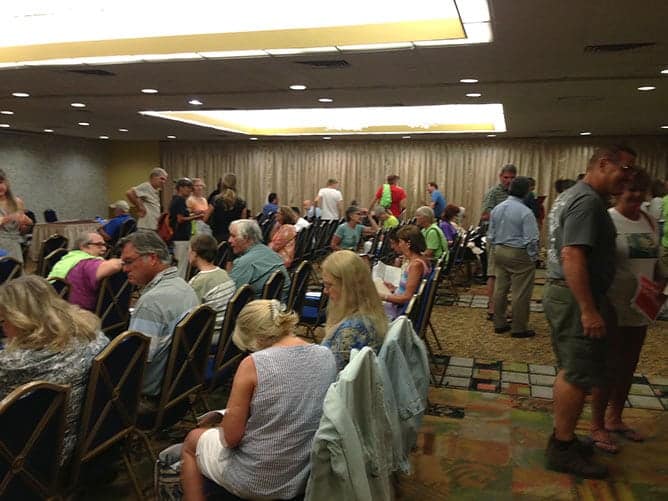FERC’s bait and switch on the PennEast pipeline
AS A JOURNALIST and a citizen, I'm a big fan of public hearings. They are opportunities for regular folks to talk about an issue that concerns them and to get educated on what others are saying.
Obviously, regular folks often don't know as much about an issue as the agency holding the hearings. Sometimes, the agency seems to merely tolerate the public comment.
Transparency, like democracy, is a messy and time-consuming business.
After all, the people up at the high table are often paid to be informed about the issue. On the other hand, these moms and pops may have to take time off work (as a teacher, a plumber, a Walmart cashier) to get involved and use what free time they have to travel to a public hearing.
Often, the folks at the high table will spend a good part of their day (and maybe their career) talking to other folks who work in the industry that the folks at the high table are paid to monitor and regulate.
Let's take an agency like the Federal Energy Regulatory Commission — it's charged with a serious job: to make sure when I flick the light switch, something happens. And mostly, it does. Thank you.
The people who work for FERC are deeply knowledgeable about their mission. Like many government agencies, there's a bit of a revolving door as people move from less-well-paid government service jobs to industry jobs that reward their experience and their knowledge.
So whether they are sitting at the high table or working away in an FERC office, the conversations among all these knowledgeable folks — including the energy businesses — is a routine part of their life.
And then these much less well-informed Regular Folks want to express their opinions. What's worse, in expressing their opinions they can get loud. Even boisterous.
Such a pain in the ass for the folks at the high table.
So instead of holding one of those open opportunities for Regular Folks to get better acquainted with an issue (remember, these people aren't paid to become experts — they're squeezing it in along with the rest of family and work obligations) somebody had an idea.
A legal idea, but a bad idea.
Instead of risking all that energy being unleashed from ill-informed Regular Folks, let's tame it.
Instead of offering seats and a microphone in a pretty big room, we'll give everyone a number, and only have five people at at time go into a closed room with two FERC staffers, who will take down whatever these Regular Folks want to say. Very orderly.
Unless all the people who have something to say have taken the precaution of printing out their comments beforehand and making maybe 200 copies, we'll never know what they said.
It's like being silenced. It's certainly not being heard. At a public hearing.
"My property is on one of the proposed routes," explained Winifred Waldron from Holland Township, N.J.. "That's why I came — to make a comment.
"I feel blindsided."
A couple of weeks ago, when FERC announced it would offer six public hearings on the PennEast pipeline, I gave FERC a quiet cheer. FERC is an agency that has a reputation of being a rubber stamp for whatever projects the energy business community suggests. More transmission lines? Sure! More pipelines? Sure.
In the past, it has seemed to be eager to get in step, if not in bed, with present-day power behemoths. Now, with these hearings it seemed to be inviting Regular People into the conversation.
I was wrong. FERC pulled a fast one.
FERC insists that these comments are added to the public record and I'm sure they are. But comments can be e-mailed to FERC and be added to the public record. You don't need to travel to Clinton, N.J., or Bethlehem, Pa., just to get your words on a page or a screen. These people traveled because they care. Because they wanted to be heard.
Not only do the people not get heard by their fellow citizens, for what it's worth, I don't get a chance to find out what Regular Folks have to say. Sure I can call the Delaware Riverkeeper, or one of the many environmental groups that are opposed to the pipeline, but I already know what they're going to say. I really wanted to hear from, yep, you guessed it: Regular Folks. And while many people right now are not that fond of journalists, the job we do can keep government honest and can keep citizens engaged.
We are living in explosive times, when the opportunity for free expression can often be a license for anger and expressions of hatred. I don't think it's helped when the people at the high table repress the voices of citizens in a misguided attempt to tidy up the process.

